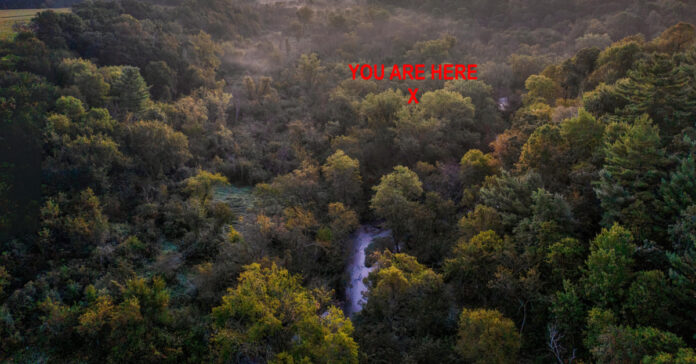
We ventured out in our borrowed pickup truck to visit for the first time a part of the world that was unaffected by Hurricane Helene. It was only the fourth time my wife had left the property in the twenty-seven days since Helene stranded us on our mountain property.
To do so, we had to borrow a truck from a friend and park it partway down the mountain. Then we had to borrow a side-by-side from a neighbor to drive back and forth between the truck and the house, using logging roads to reach the one remaining bridge. Sure, we could have walked across the creek and up and down the mountain, but we spent $500 between Sam’s Club and Kroger, so it would mean multiple hiking trips carrying a load over a couple of days. Much easier to load up the side-by-side and make just two trips.
I can’t say enough good things about the Polaris Ranger we are using. It has good suspension, great ground clearance, and can fight its way up steep, rocky roads that I cannot take my truck on. It also can carry something like 700 pounds in the bed. (The specs vary by model and year.) The only negative is that the 2024 version of the model we are borrowing starts at about $20,000. That’s more than the first two cars I owned combined. Yikes!
When we passed through town today, I saw two trucks from the local internet company. I wondered, how long will it take them to get to our road? Quite a while, is my guess. That’s a downside of living well outside of town. But as a prepper, I find the benefits of living in a remote location are worth it.
Living in a Remote Locations
We like being well off the beaten path because no one comes out here. That gives us privacy. We can do pretty much what we want and there is no one to complain. The downside of being isolated is that any calls to fire, EMS, or the sheriff take at least 20 and more likely 30 minutes for a response. We are on our own, but being independent minded, we are OK with that. Besides, there are some cities where it takes 911 even longer to respond. In the end, we are all on our own; some folks just don’t realize it.
I know some people choose to live in an area so remote that you always have to use a four-wheeler or a snow machine to get there. We didn’t, but now we have been for four weeks, and we may be for more weeks to come. It is a hassle.
I can see doing it if you live in Alaska or somewhere equally remote and hunt, fish and trap to sustain yourself, but outside of a survival situation, we count on the grocery store. A remote, off-grid, no-roads lifestyle would be doable if you plan to go to town only two to four times a year, or if you can go by boat in the summer. You have to really want to be left alone because that kind of living means you can’t take advantage of the amenities the town offers.
For us, a dead-end dirt road six miles from a small village is a good compromise. We feel like we are in the middle of nowhere, without being in the middle of nowhere.
Sam’s Club
Life was normal at Sam’s Club, which is usually 90 minutes away, but with the road damage now takes even longer to reach. The only sign of Hurricane Helene was a lack of generators and four empty spots in the canned food aisle, two of which had previously held Chef Boyardee products. I can only assume well-meaning people bought it all up to contribute to the relief effort.
Plenty of other things that would have made great donations—like cans of spam and chili and boxes of hash brown potatoes—were in stock at Sam’s. Inventory levels were good.
I’d like to see things like boxes of pancake mix, canned meats, rice, pasta and jars of sauce, stews, and soups (including creamed soups which are useful in casseroles) in hurricane relief donations. This area is going to be recovering for months and people will want to make hearty meals. Granola bars will not hold us. We need ingredients like potatoes, flour, sugar, and maybe yeast or baking soda. And while people need bottled water, I have seen almost no coffee or juice.
Among the things we bought at Sam’s to restock our freezer were eight pounds of bacon, six pounds of ground meat, two pork loins, three pounds of Italian sausage, some lamb chops, salami, and salmon. We also bought at least four kinds of cheese. All good for hearty, protein-rich meals.
Generator Shortage
Generators seemed in short supply all around the hurricane-hit region. In fact, we drove by a Home Depot that had a spray painted sign on plywood proclaiming “Generators in Stock.”
I have been looking for a particular generator, the Predator 8750 from Harbor Freight. This produces more than twice as much power as my current model and has an inverter, so it provides very clean energy. This makes it suitable for recharging the whole-house batteries that are part of our solar power system. It may not be the world’s best generator, but it gets good reviews and will recharge my batteries in four hours, just what I will need if a snow storm that knocks our power out for days.
This generator would have been great to power our batteries during the cloudy days following Helene, but dumb me didn’t buy one before because I was waiting for a sale. Well, this week Harbor Freight had a $100-off coupon for that model. I checked all the stores within a 100-mile radius, and they were sold out. I called my prepper friend Karl, who lives in my old home town in another state, and he agreed to buy one for me. The next day, he texted me a photo of it sitting in the back of his truck. Now we just have to arrange for him to come out here after the road is repaired.
I plan to give my old generator to my daughter and son-in-law to use the next time they have a power outage. They were concerned about losing all the food in their freezer after an ice storm last winter.
Gasoline Storage
I also need to find a safe and legal way to store a larger quantity of gasoline. This is a challenge because I do not have out buildings, but I don’t want to leave them outside where someone could use them to start a fire. I guess I could build a small shed well away from the house just for fuel storage.
When in use and not secured inside my garage, I usually use a chain to lock my generator to the front porch. This is an old habit from when I lived in the city and people would steal your generator during a long power outage. (A common trick was for them to start a lawnmower and leave it running while they drove off with your generator. The homeowner would hear the lawnmower engine and assume their generator was running.)
The new generator weighs 150 pounds, so I won’t want to wheel it around too much. I am thinking of removing the wheels and mounting it permanently under the back deck. I could then build some kind of storage enclosure for it, to keep out the sun and rain. We’ll have to see if that is practical once I get it on site.







We store petrol, diesel and oils (U have engine and 2 stroke oil as well don’t u ?0, in a small shed well away from the houses. Don’t forget to install a lightning arrester and earth stake on it according to your local code.
Comments are closed.